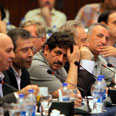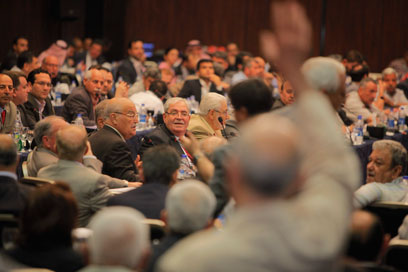
The meeting
Photo: AP
Syrian opposition groups have failed to form a united leadership at a meeting that exposed vast disagreements that have prevented them from effectively leading the uprising against President Bashar Assad.
An Arab League-sponsored conference in Cairo aimed at uniting the fractured Syrian opposition ended in chaos Tuesday when the Kurdish delegation stormed out.
Related stories:
- Report: Syria running 27 torture centers
-
Russia: Assad not required to step down
-
'Key figures in Assad regime may soon join rebels'
The conference ended with an agreement on two documents, both vague: One provides a general outline to guide the opposition through a transitional period, while the other lays out the fundamental principles envisaged for a post-Assad Syria.
The delegates agreed in general terms on support for the Free Syrian Army, the dissolution of the ruling Baath Party and the exclusion of Assad or other senior regime figures from a place in the transition.
But they failed to reach an agreement on forming a unified body to represent the opposition.

Chaos? The meeting (Photo: AP)
The 250 participants seemed unable to agree on over key questions, including whether to ask for foreign military intervention to halt the violence and what role religion would play in a post-Assad Syria.
"It's very dangerous at this point," said Abdel-Aziz al-Khayyar, who spent 14 years in Syrian prisons and is now part of the Syrian National Co-ordination Body. "If we fail to unify as the opposition it is the greatest gift to the regime."
The discord stems, in large, from the fact that the two largest opposition groups distrust each other. Members of the Syrian National Council accused the Syrian National Co-ordination Body, known as the NCB, of being too close to the regime.
For its part, the NCB accuses the SNC of being a front for the Muslim Brotherhood and Western powers.
One independent activist said all agreed that Assad must go, but that there are many different views of what follows.
"These are sensitive issues that go back to people's ideologies," said Ziad Hassan, 28. "It could take two years, not two days, to get over our differences."
AP contributed to this report
- Receive Ynetnews updates
directly to your desktop















